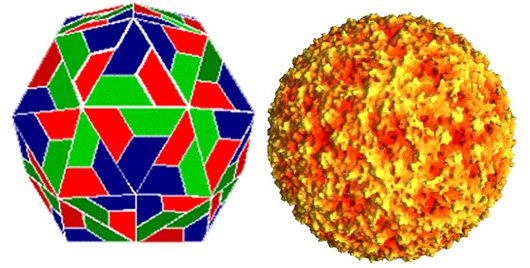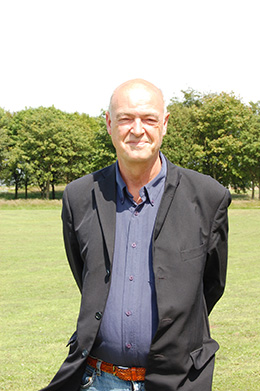Researchers receive £400,000 to develop Foot and Mouth vaccine

Researchers at the University of St Andrews have been awarded a £400,000 grant to help find a vaccine for Foot and Mouth Disease, in collaboration with scientists in India.
The award made by the Biotechnology and Biological Sciences Research Council (BBSRC), with matched funding from India’s Department of Biotechnology (DBT), will allow a team led by Professor Martin Ryan to extend their fight against one of the most contagious mammalian viruses.
The Foot and Mouth Disease Virus (FMDV) is one of the most contagious viruses in domestic livestock including cattle, sheep, goats and pigs.
Current vaccines require expensive, high-containment, production facilities and animals require multiple boosters throughout their lives to be protected against FMDV. These factors make current vaccines both expensive and difficult to administer in many areas of the developing world where the virus is endemic.
Outbreaks of FMDV in the UK in 2001 and 2007 had devastating effects on farming. The 2001 outbreak cost the UK economy billions and millions of animals had to be destroyed.
 Professor Martin Ryan, Professor of Translational Virology in the School of Biology at the University, and an international expert in the field, will lead the study, working with colleagues at the Indian Veterinary Research Institute (IVRI) in Bangalore.
Professor Martin Ryan, Professor of Translational Virology in the School of Biology at the University, and an international expert in the field, will lead the study, working with colleagues at the Indian Veterinary Research Institute (IVRI) in Bangalore.
Professor Ryan said: “The new Farmed Animal Health and Disease (FADH) award will allow us to extend our work on developing new vaccines into serotypes of FMDV that are of direct importance to Indian agriculture.
“The FADH grant funds a collaborative research project involving scientists at both St Andrews and the Indian Veterinary Research Institute (IVRI), Bangalore – with significant staff interchange between the two sites.”
The funding was announced today by Sir Mark Walport, the UK Government Chief Scientific Adviser, while in New Delhi this week, for research projects which aim to tackle major livestock diseases which threaten food security in the UK and globally.
Science Minister David Willetts said: “In the face of a rapidly growing global population, it is vital that we work together to find innovative solutions to animal diseases and global food security. This significant £13 million investment is ensuring this important work can take place and supports the Government’s wider Agri-Tech strategy. This is helping UK businesses, including farmers, make the best use of new technologies and techniques to meet the needs of consumers and food producers worldwide, as well as contributing to economic growth.”
Professor Jackie Hunter, BBSRC Chief Executive said: “Livestock health is a huge global problem, impacting on the economy and food security. These projects will enable collaboration and shared knowledge in a bid to create novel control measures and technologies to combat infectious diseases that devastate farms in the UK and India.”
£6.5M has been awarded by the UK’s Biotechnology and Biological Sciences Research Council (BBSRC), with matched funding from India’s Department of Biotechnology (DBT), for collaborative research projects between universities and research institutes in both countries.
Other projects which have also received funding include: research towards TB control in cattle; understanding the different responses to avian Influenza viruses; studying tick-borne disease; creating biosensors for infectious reproductive diseases of cattle; assisting a global alliance against the goat plague ‘Peste des Petits Ruminants’; finding an effective vaccination programme for the eradication of foot-and-mouth disease in India, and understanding why some animals have disease immunity.
Note to Editors
This latest grant builds on an ongoing £5.6million project, led by the University of St Andrews in collaboration with the Pirbright Institute, and the Universities of Dundee, Edinburgh and Leeds in the search for a vaccine for livestock.
The Biotechnology and Biological Sciences Research Council (BBSRC) awarded the £5.6m to the five year project last year.
This new collaboration has been greatly facilitated by Post-doctoral Research Fellow, Dr Uday Pathania, from India, who worked on the existing project, whose contacts within the Indian veterinary research community has been invaluable.
Professor Ryan is available on: 01334 463403.
For images please contact the press office.
Issued by the Press Office, University of St Andrews
Contact Fiona MacLeod on 01334 462108 / 0771 414 0559.
Ref: (FMDV India 13/11/13)
View the University’s latest news at www.st-andrews.ac.uk/news
Category Research